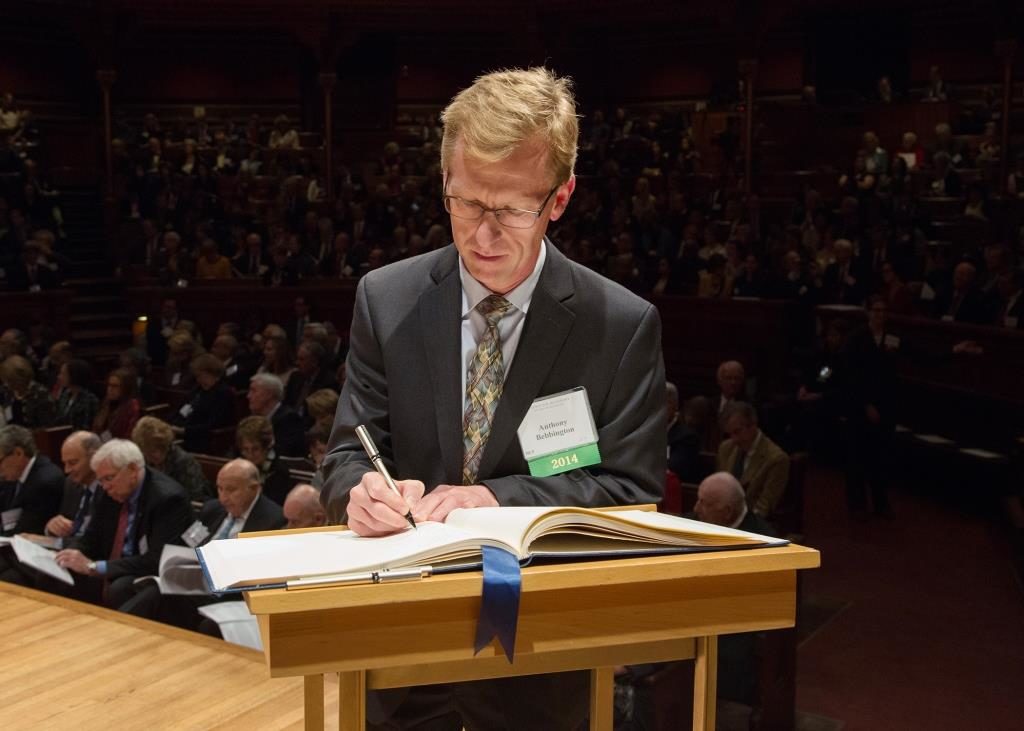
CAMBRIDGE, Mass. –Clark University Professor of Geography Anthony J. Bebbington was among 164 influential artists, scientists, scholars, authors, and institutional leaders who were inducted into the American Academy of Arts and Sciences at a ceremony in Cambridge on October 11. The ceremony included talks by five new inductees: Yale physicist Ramamurti Shankar; Diana Wall, ecologist and professor of biology at Colorado State University; Massachusetts Institute of Technology sociologist and social networking expert Sherry Turkle; University of Michigan history professor Mary Kelley; and John W. Rogers, Jr., Founder, Chairman, and Chief Executive Officer of Ariel Investments. Yale University law professor John Fabian Witt and Stanford University professor Linda Darling-Hammond read from the Letters of John and Abigail Adams.
“The Induction Ceremony recognizes the achievements of today’s most accomplished individuals. The distinguished women and men who were inducted this weekend have engaged in innovative research, examined every aspect of our society, and continue to pursue solutions to the most pressing challenges of the day. They are all leaders of the respective fields and the Academy offers them an opportunity to work together to advance the common good.”
~Academy President Jonathan Fanton.
Founded in 1780, the American Academy is one of the nation’s oldest and most prestigious learned societies, and an independent research center that draws from its members’ expertise to conduct studies in science and technology policy, global security, the humanities and culture, social policy, and education. Members of the 2014 class include winners of the Nobel Prize; the Wolf Prize; the Pulitzer Prize; National Medal of the Arts; MacArthur, Guggenheim, and Fulbright Fellowships; and Grammy, Emmy, Oscar, and Tony Awards. Professor Bebbington’s research addresses the political ecology of rural change, with a particular focus on extractive industries and socio-environmental conflicts, social movements, and indigenous organizations and livelihoods. He has worked throughout South and Central America, primarily in Peru, Ecuador and Bolivia, and more recently in El Salvador. In addition to the Induction ceremony, weekend events also included:
- Celebration of the Arts and Humanities on October 10 with readings and presentations by writers Frank Lentricchia, Jill Lepore, and Amy Hempel; poets Linda Gregerson and Mary Jo Salter;curator Maxwell Hearn;sculptor El Anatsui; and video performances by musician Ralph Stanley and choreographer Tere O’Connor.
- A Briefing on October 11 featuring presentations by leaders of Academy policy projects including Science Policy, Global Security and Energy, and Humanities, Education and Social Policy.
- On October 12, Robert D. Ballard, Founder and President of the Ocean Exploration Trust; Director of the Center for Ocean Exploration and Professor of Oceanography at the University of Rhode Island Graduate School of Oceanography, presented “Ocean Exploration – Past, Present, and Future”.
To see an alphabetical list of the new Academy members, click here. The new class listed by discipline is online here. Since its founding by John Adams, James Bowdoin, John Hancock, and other scholar-patriots, the American Academy has elected leading “thinkers and doers” from each generation. The current membership includes more than 300 Nobel laureates, some 100 Pulitzer Prize winners, and many of the world’s most celebrated artists and performers.
Related links:
Clark University Prof. Bebbington elected to esteemed American Academy of Arts and Sciences
Bebbington awarded Guggenheim Fellowship
Founded in 1887 in Worcester, Massachusetts, Clark University is a liberal arts-based research university addressing social and human imperatives on a global scale. Nationally renowned as a college that changes lives, Clark is emerging as a transformative force in higher education today. LEEP (Liberal Education and Effective Practice) is Clark’s pioneering model of education that combines a robust liberal arts curriculum with life-changing world and workplace experiences. Clark’s faculty and students work across boundaries to develop solutions to complex challenges in the natural sciences, psychology, geography, management, urban education, Holocaust and genocide studies, environmental studies, and international development and social change. The Clark educational experience embodies the University’s motto: Challenge convention. Change our world.


